#NHLPeachy @NHL #WhomYouKnow Recap: 2017-18 NHL Regular Season Vegas takes sports world by storm in inaugural season; Record playoff turnover yet again; Goal-scoring at highest level since 2006-07
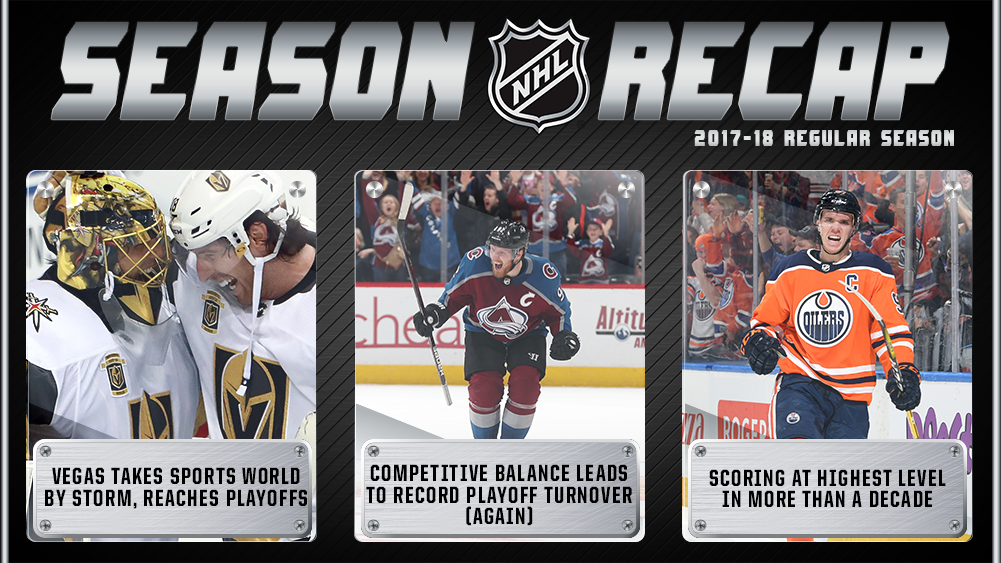
A look back at the 2017-18 NHL season, the highest-scoring campaign since 2006-07:
QUICK HITS
* The Golden Knights became the first modern-era expansion team from any of the four North American professional sports leagues to start from scratch and win its division (excluding mergers and all-expansion divisions, according to Elias).
* Seven teams who were not part of the 2017 Stanley Cup Playoffs qualified in 2017-18 to match the largest year-to-year change in NHL history (for the second straight campaign and third time in four seasons).
* For only the fourth time since the conference format was introduced in 1974-75 – and second straight campaign – the last-place team from each conference reached the playoffs the following season, with both the Avalanche and Devils making the leap from 2016-17.
* Goal scoring was up 7% over last season, with an average of 5.9 goals per game. The 7% increase in goals from 2016-17 to 2017-18 represents the largest year-to-year spike since a 9% rise from 1979-80 to 1980-81, excluding a 20% increase from 2003-04 to 2005-06 that followed various rule changes.
GOLDEN KNIGHTS TAKE SPORTS WORLD BY STORM IN INAUGURAL SEASON
After an 8-1-0 start that featured an emotional home-opening victory to help rally a grieving city, the Golden Knights finished their unprecedented inaugural season with a 51-24-7 record (109 points) and the Pacific Division title. A detailed recap of their memorable season is available here, while some of their most impressive achievements are listed below:
* The Golden Knights became the first NHL expansion team since 1968-69 to start from scratch and make the playoffs. The Oilers and Whalers did so in 1979-80 after joining from the World Hockey Association.
* The Golden Knights became just the third NHL expansion team ever to win its division: the 1926-27 Rangers won the American Division and 1967-68 Flyers won the all-expansion West Division.
* Vegas became the first modern-era expansion team from any of the four North American professional sports leagues to start from scratch and win its division (excluding mergers and all-expansion divisions, according to Elias).
* The Golden Knights (5th place) became the first expansion team from any of the four North American professional sports leagues to start from scratch and finish among the top five in the league (since 1961, excluding 1967-68 NHL season). Elias notes that the 1976-77 Denver Nuggets tied for second place overall in their first NBA campaign after joining from the American Basketball Association.
COMPETITIVE BALANCE LEADS TO RECORD PLAYOFF TURNOVER (AGAIN)
* Seven teams who were not part of the 2017 Stanley Cup Playoffs qualified in 2017-18 (COL, LAK, NJD, PHI, TBL, VGK, WPG) – including the expansion Golden Knights – to match the largest year-to-year change in NHL history. This marks the second straight campaign and third time in four seasons that seven new teams will play in the postseason. Overall, there has been playoff turnover of at least five clubs in 11 of the past 13 seasons.
* For only the fourth time since the conference format was introduced in 1974-75 – and second straight campaign – the last-place team from each conference reached the playoffs the following season, with both the Avalanche and Devils making the leap from 2016-17. The other instances: Red Wings/Rockies (last in 1976-77), Bruins/Sharks (last in 1996-97) and Maple Leafs/Oilers (last in 2015-16).
* The Avalanche (43-30-9, 95 points) clinched a spot in the 2018 Stanley Cup Playoffs after finishing in last place overall in 2016-17 (22-56-4, 48 points). Their 47-point differential matched the fourth-highest year-to-year improvement by any team in NHL history.
* The Devils (44-29-9, 97 points) also reached the playoffs after finishing in last place in the Eastern Conference in 2016-17 (28-40-14, 70 points) and winning the Draft Lottery to collect the first overall pick in the 2017 NHL Draft. Their 27-point differential is the highest year-to-year improvement in franchise history.
* The Jets (+27), Predators (+23) and Lightning (+19) also made significant leaps in the standings compared to last season:
Winnipeg finished second in the Western Conference after missing the 2017 Stanley Cup Playoffs by seven points.
Nashville won the Presidents’ Trophy after being the lowest seed in the 2017 Stanley Cup Playoffs.
Tampa Bay claimed first place in the Eastern Conference after placing 10th in 2016-17.
* Overall, 11 clubs reached the 100-point mark: Nashville, Winnipeg, Tampa Bay, Boston, Vegas, Washington, Toronto, Minnesota, Anaheim, Pittsburgh and San Jose. The Bruins reached the milestone for an NHL-record 22nd time, while the Jets and Golden Knights posted their first such campaign.
GOALS, GOALS, GOALS
There were 7,552 goals scored over the 1,271-game schedule in 2017-18 (including 103 shootout-deciding goals), an average of 5.9 goals per game.
* Only two other seasons since 1996-97 have featured at least 5.9 goals per game: 2005-06 (6.2; 7,588 G in 1,230 GP) and 2006-07 (5.9; 7,246 G in 1,230 GP).
* The 7% increase in goals from 2016-17 to 2017-18 represents the largest year-to-year spike since a 9% rise from 1979-80 to 1980-81, excluding a 20% increase from 2003-04 to 2005-06 that followed various rule changes.
* Twenty-one players recorded at least 80 points in 2017-18 after only seven players hit the mark last season. Since 1996-97, only three campaigns have seen more players hit 80 points: 2006-07 (28), 2005-06 (26) and 1996-97 (22).
* Edmonton’s Connor McDavid (41-67—108 in 82 GP; 1.32 P/GP) won his second straight Art Ross Trophy and led a group of 24 players who averaged at least one point per game in 2017-18 (min. 25 GP), the most in one campaign since 2006-07 (32). There were eight such performances in each of the past three seasons.
* Three players hit the 100-point mark (also Claude Giroux: 34-68—102 and Nikita Kucherov: 39-61—100), the most since 2009-10 when four players did so.
* Eight players scored at least 40 goals in 2017-18, led by Alex Ovechkin (49) who became the second player in NHL history to lead the League in goals seven times. Eric Staal (42) hit the mark for the first time since 2008-09 to join Gordie Howe (11) as the only players in League history to have at least eight seasons between 40-goal campaigns.
* Eighty-one hat tricks were scored in 2017-18, including two on each of the first two days of the season and four on the second-to-last day. Only five seasons since 1990-91 have seen more three-goal games.
* There were 67 instances of a team scoring at least seven goals in a game, the most in any season since 1995-96 (105).
* Overall, 82% of all skaters scored at least one goal in 2017-18 (726 of 890) – tied for the highest percentage in one season since 1980-81 (85%; 484 of 570).
* Fewer teams profited by winning low-scoring games. The number of times a team posted a win while recording two or fewer goals in regulation/overtime dropped 16% as compared to 2016-17, the sharpest year-to-year decrease since a 43% decline from 2003-04 to 2005-06 (excluding the shortened 2012-13 season).
HUGE IMPROVEMENTS LEAD TO CAREER SEASONS
Twenty-one players boosted their point totals by 25 or more as compared to 2016-17 (min. 50% of team GP), including seven who had improvements of 40+ points. Overall, eight of the top 10 point-getters and seven of the top 11 goal-scorers set career highs.
* Golden Knights forward William Karlsson (+53) showed the most dramatic shift, finishing with 43-35—78 (82 GP) after posting 6-19—25 with the Blue Jackets last season (81 GP). His 37-goal improvement matched the third-largest year-to-year boost in NHL history (min. 50% of team GP, excluding shortened seasons).
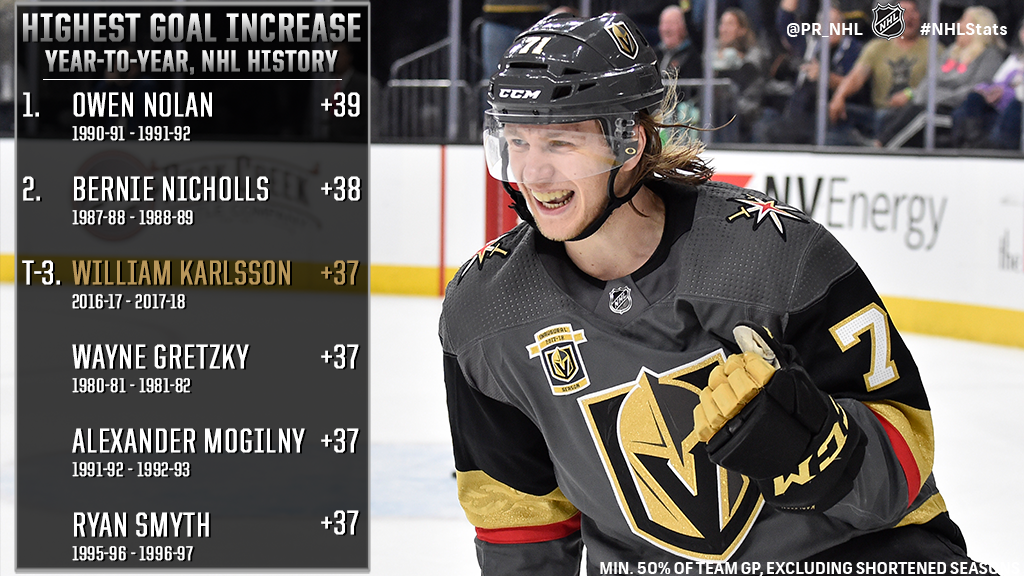
* Avalanche teammates Mikko Rantanen (+46) and Nathan MacKinnon (+44) powered Colorado into the playoffs after a last-place finish in 2016-17. They were one of two sets of teammates to each have year-to-year improvements of 40+ points. There is only one other example from the past 24 years of teammates from multiple clubs each finishing with 40+ increases in points: 2003-04 to 2005-06 (ANA, DET, EDM, NYR and SJS).
* The Flyers’ duo of Claude Giroux (+44) and Sean Couturier (+42) also finished with boosts of 40+ points. Giroux became the third different Flyersplayer to finish among the top two in NHL scoring (Bobby Clarke 2x and Eric Lindros) and the third to at least share the League lead in assists, joining Clarke (1974-75 and 1975-76) and Mark Recchi (1999-00).
* Devils forward Taylor Hall (+40) completed his second campaign with New Jersey by posting the fourth-highest single-season point total in franchise history (39-54—93). He had 41 more points than his next-closest teammate – Nico Hischier (20-32—52), the No. 1 pick in the 2017 NHL Draft – marking the highest such differential in the NHL since 2007-08 (Alex Ovechkin: 112, Nicklas Backstrom: 69 w/ WSH).
* Kings captain Anze Kopitar (+40) nearly tripled his 2016-17 goal total to finish with 40 more points than he had last season (35-57—92). He finished seventh in League scoring, the highest rank by a Kings player since 1993-94 when Wayne Gretzky won the Art Ross Trophy.
McDAVID, OVECHKIN ADD TO AWARDS COLLECTION
* Oilers captain Connor McDavid (41-57—108) became the second player in NHL history to lead the League in scoring multiple times before age 22, joining Wayne Gretzky who did so three times. McDavid had 38 more points than his next-closest teammate and factored on 47% of Oilersgoals (108 of 229 in regulation/overtime) – the highest such percentage since 2007-08 (Alex Ovechkin: 47% w/ WSH). Mario Lemieux set the NHL record of 57% with the Penguins in 1988-89 (199 of 347).
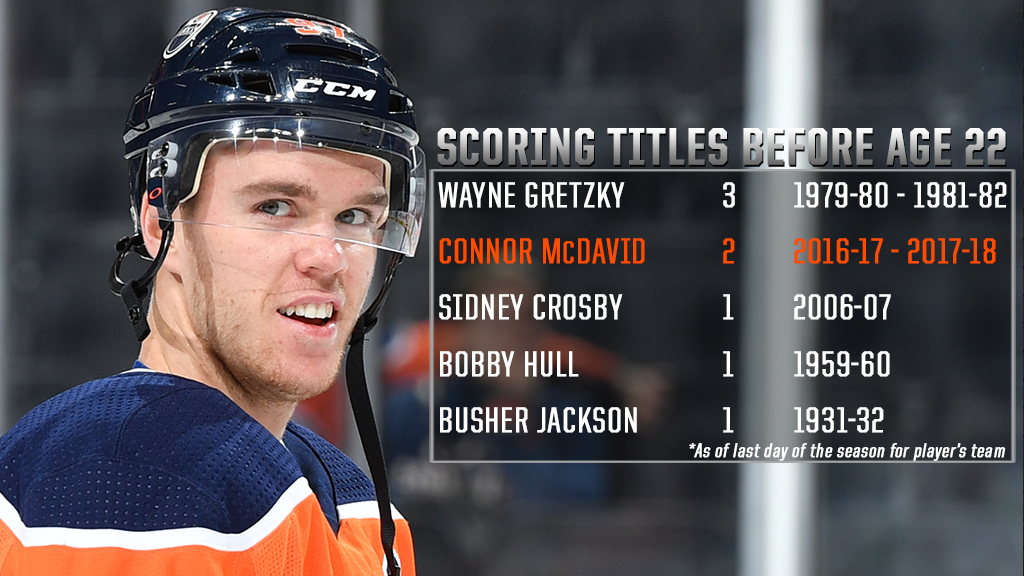
* Capitals captain Alex Ovechkin became the fourth-fastest player to hit the 600-goal milestone in March and scored twice in his final game of the season to hit 49 goals and capture his seventh Maurice “Rocket” Richard Trophy. Ovechkin matched Bobby Hull for the most seasons as the NHL goals leader. At 32 years, 203 days, Ovechkin also became the oldest player to win the NHL’s goal-scoring title since Phil Esposito in 1974-75 (33 years, 45 days w/ BOS).
NOTABLE PLAYER PERFORMANCES
* The Lightning duo of Nikita Kucherov (39-61—100) and Steven Stamkos (27-59—86) finished third and 12th in League scoring, respectively, aided by simultaneous season-opening point streaks of 11 games (just the seventh such instance in NHL history).
* The Penguins became the first team since the 2003-04 Lightning to have three players finish among the top 10 in League scoring (Evgeni Malkin, Phil Kessel and Sidney Crosby). It marked the sixth time the Penguins have achieved the feat – the most of any franchise in the expansion era.
* Tampa Bay’s Andrei Vasilevskiy (44-17-3), Winnipeg’s Connor Hellebuyck (44-11-9) and Toronto’s Frederik Andersen (38-21-5) each established franchise records for wins in a season, while Nashville’s Pekka Rinne (42-13-4) posted the third 40-win season in club history (all by him).
* Vasilevskiy became the 12th different goaltender in NHL history to finish a season with at least a share of the League lead in wins before celebrating his 24th birthday – Carey Price (2010-11) is the only other goaltender to do so since 1996-97. Hellebuyck, meanwhile, matched the NHL record for home wins in a season (30).
NEW FACES SHINE, SOPHOMORES KEEP ROLLING
For the first time since 1993-94, seven rookies recorded at least 50 points, led by Islanders forward Mathew Barzal (22-63—85) who paced rookies in assists and points. Jets forward Kyle Connor (31-26—57) led rookies in goals – one of eight rookies to score at least 20 goals in 2017-18. Only two campaigns since 1990-91 have featured more than eight 20-goal rookies: 1992-93 (12) and 2005-06 (11).
* Barzal joined Hall of Famers Bryan Trottier and Mike Bossy as the only Islanders to record 80+ points as a rookie and became the fifth rookie since 1995-96 to average at least a point per game (1.04). His 63 assists were the third-most ever by a rookie in NHL history (tied).
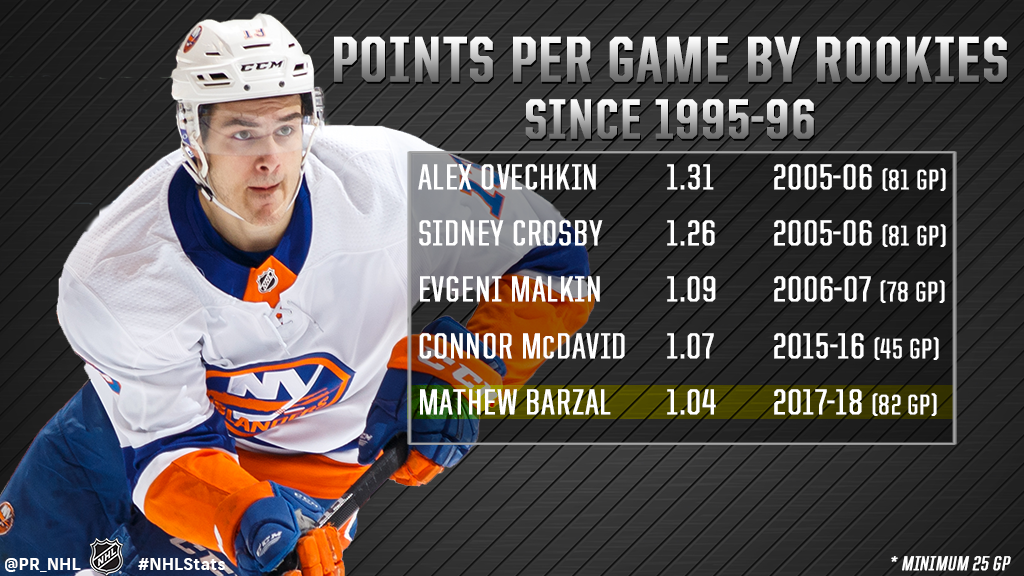
* Connor became the second Jets rookie in as many seasons to reach 30 goals, marking the eighth time in NHL history that a team featured at least one 30-goal rookie in consecutive campaigns.
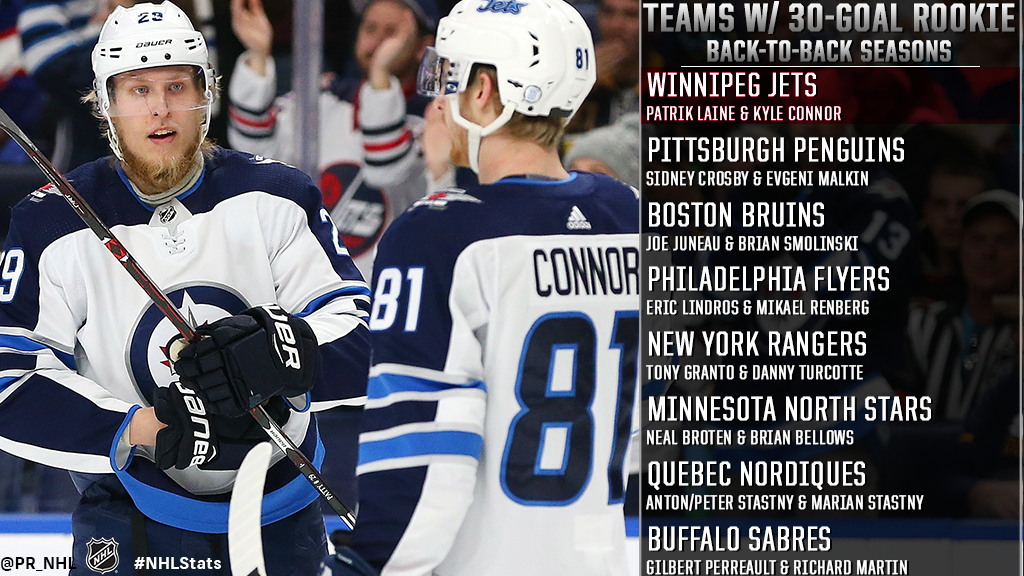
* Meanwhile, sophomore forwards Patrik Laine (44-26—70) and Auston Matthews (34-29—53) each hit the 30-goal mark for a second straight season. They are the 11th set of players in NHL history to enter the League at the same time and each score 30+ goals in each of their first two seasons. Sidney Crosby and Alex Ovechkin (2005-06 and 2006-07) are the only others to do so in the past 25 years.
* Laine (80 goals), who will turn 20 on April 19, is one of three players in NHL history to score at least 80 regular-season goals as a teenager (Jimmy Carson: 92 and Dale Hawerchuk: 85).







































































































